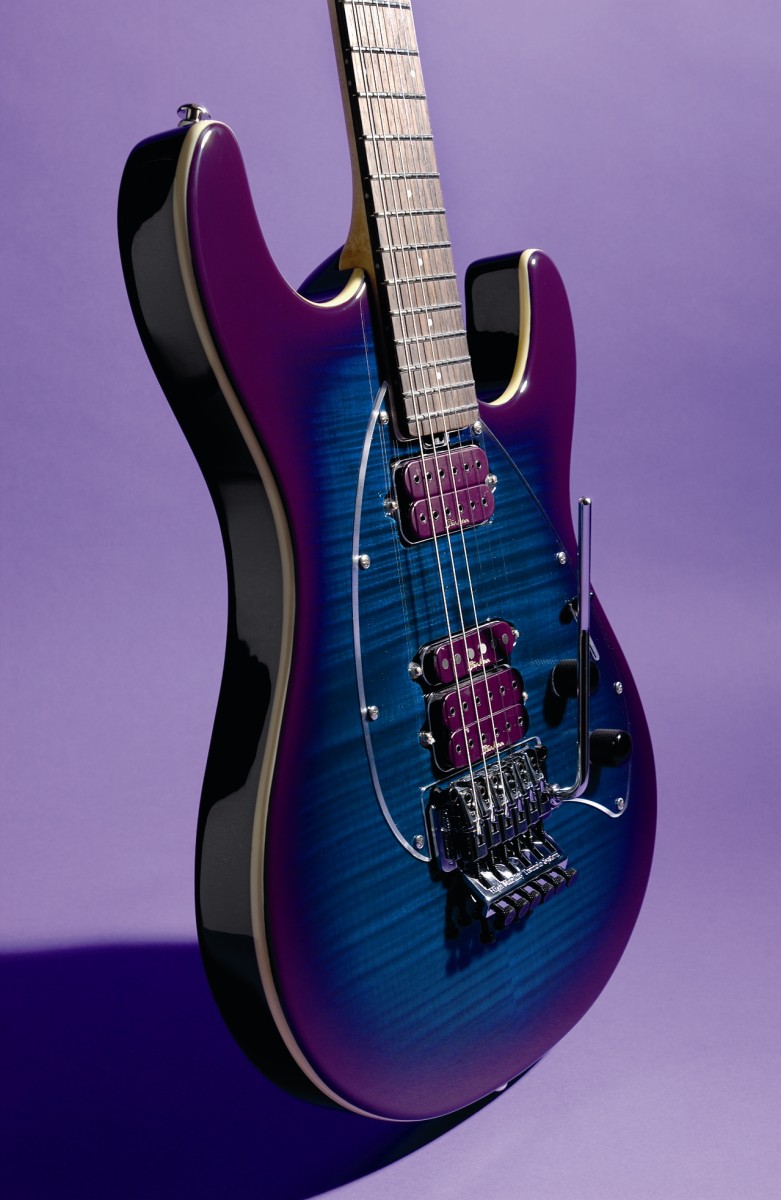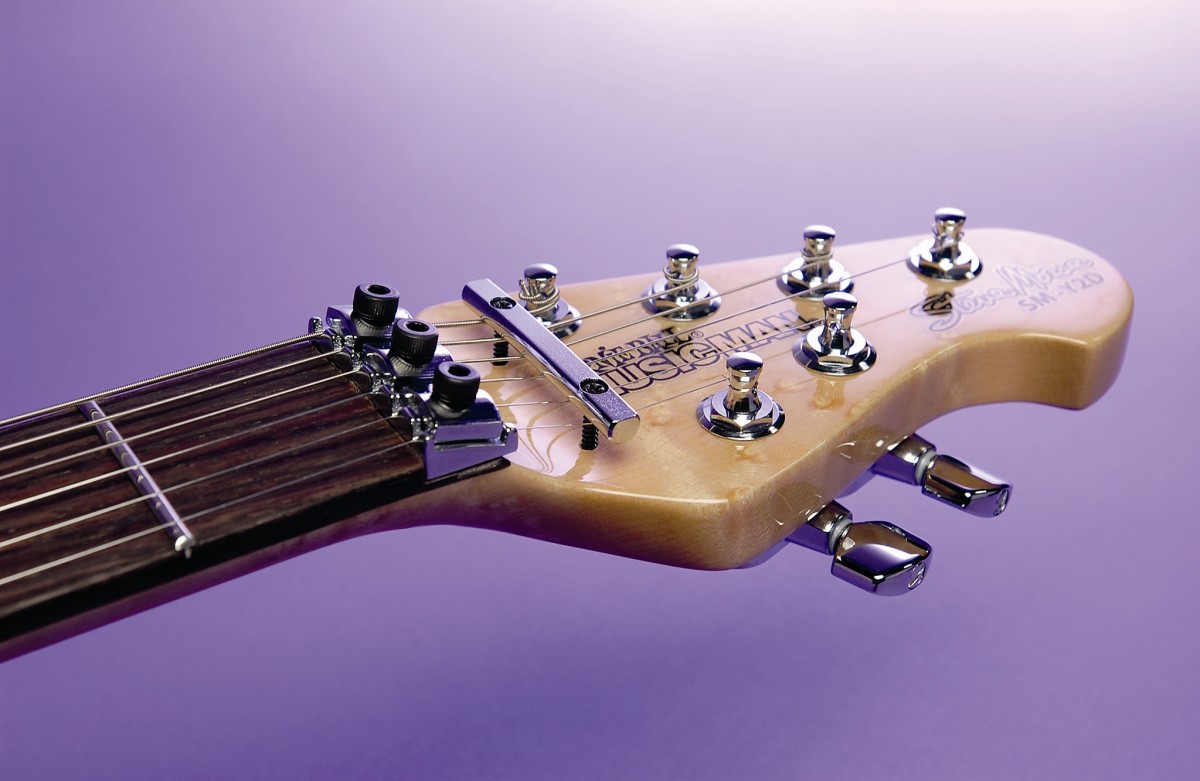MusicRadar Verdict
We're yet to a play a Music Man guitar we can't get on with and thanks to the streamlined design here we can add the Steve Morse Y2d signature to our list. It offers a top-notch playing experience, and could replace your collection of Strats and Teles in one fell swoop.
Pros
- +
Amazingly comfortable neck. Broad range of tones.
Cons
- -
The drop in signal between some of the pickup settings.
MusicRadar's got your back

Music Man Steve Morse Y2d

Music Man Steve Morse Y2d
The first Morse signature came on the market in 1985, after Steve spent years playing a 'hybrid' Telecaster with had a Strat neck, a tune-o-matic bridge, a 12-string tailpiece and giant Gibson frets.
The main problem that just about everyone who tried one found with the original MM Morse was its inherent complexity regarding the pickups and associated selectors. As well as featuring the same two DiMarzio humbuckers and so-called proprietary custom wound single-coil that this Y2d model does, it also boasted a further single-coil - a DP-108 - and no less than three selectors: a pair of three-way toggles plus a three-way lever. Giving a total of 11 possible selections certainly ensured the guitar was versatile, but it certainly wasn't easy to get around, and we didn't really miss the possible combination of the bridge and neck humbuckers anyway.
Design
Everything has been stripped down here - including the removal of one single-coil and both toggles - with the three-way lever being replaced by the more traditional five-way variety. An unusual feature is the placement of this single-coil immediately adjacent to the DP-200 in the bridge and, although the option of soloing this coil isn't available here, position two combines it with the full humbucker and position three with its closest neighbouring coil. While we're on the subject, position four combines both humbuckers in parallel - told you we didn't miss it - with the final position soloing the neck 'bucker.
Poplar is a less-frequently used bodywood with electric guitars, but its dense yet lightweight properties make it perfect for enhancing that classic single-coil snap while at the same time allowing humbuckers to breathe when required. For the 20th anniversary model the poplar is topped with a slab of either quilted or (as in this case) flamed maple, and finishes include a rib-cracking De-purple burst that's as easy on the eye as the pun is on the ear. A clear scratchplate, in this instance, is an excellent idea too and we should point out that the purple coil surrounds are limited to examples of this finish; with the two other colours they're good old black.
Even though Music Man is a mainstream name these numerous options still remain part and parcel of what the company offers, allowing them to keep at least one foot in the 'custom builder' genre. Therefore you're able to spec this and most other MM guitars to suit, with options here including a hard-tail composed of a chrome-plated brass block, a headstock paint job to match the body, and a premium grade maple top.
The hard-tail option also includes a sextet of locking tuners but, with the Floyd Rose licensed vibrato, set flush to the body by the way, the locking nut does away with the need for these leaving six chrome Schaller M6LA machines to adorn the classic 14.9cm-long headstock in the usual 4+2 manner.
Want all the hottest music and gear news, reviews, deals, features and more, direct to your inbox? Sign up here.
One of the best features of all Music Man guitars has to be the feel of the necks, and here the single piece of birds-eye maple has been hand rubbed and finished with the usual aplomb using the staple mix of gunstock oil and a wax blend.
Off to a good start then, but what raises the feel here above even the remainder of MM's American catalogue is that its slimmer, and therefore ultra-comfortable, profile has been meticulously taken from Steve's own original model - a guitar that has toured the world many times and has required and received no less than eight re-frets. It feels remarkable, and if the more traditional clubby nature of the majority of Music Man's necks doesn't much float your boat, the Morse Y2d definitely will. It's effortless to play along its entire length with perfect fretwork and a quality set-up.
In use
The very first thing that's apparent upon plugging in is the aforementioned 'tightness' to the sound, further accentuated here by the maple top. Initial impressions certainly lean towards Morse's initial vision of a Strat/Tele/Gibson hybrid and, even though the pickup array has been simplified, it's still possible to go from a Slash-style rhythmic roar to a restrained Tele mid-position at the flick of the lever and the merest tweak of the volume. We found our favourite rock rhythm tone to be based around the combination of both humbuckers as the influence of the neck unit helps to smooth and slightly flatten the peaky performance of its bridge-based sibling. The neck pickup solo'd allows you to mimic the classic Morse legato (assuming your technique is up to scratch) while the greater part of cleaner amp settings scream 'Fender' at every turn, especially with position three.
Offering rounder mids than a Tele's bridge pickup and trebles more strident than the equivalent Strat setting, both positions involving the single-coil are impressive indeed.
The only down side to this versatility is the overly conspicuous drop in volume between some of the settings; switching from positions three to four is especially guilty of drop-out. Of course, if the outputs were matched more closely, we wouldn't be revelling in the crystal clean tones we mentioned, so we can live with things in this instance: but be aware.
Tuning stability is spot-on thanks in part to the flush-mounted whammy and, all things considered, we'd change very little all round here.
MusicRadar is the number one website for music-makers of all kinds, be they guitarists, drummers, keyboard players, DJs or producers...
- GEAR: We help musicians find the best gear with top-ranking gear round-ups and high-quality, authoritative reviews by a wide team of highly experienced experts.
- TIPS: We also provide tuition, from bite-sized tips to advanced work-outs and guidance from recognised musicians and stars.
- STARS: We talk to musicians and stars about their creative processes, and the nuts and bolts of their gear and technique. We give fans an insight into the craft of music-making that no other music website can.
